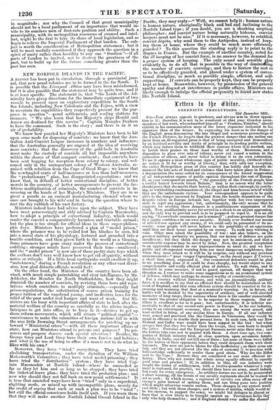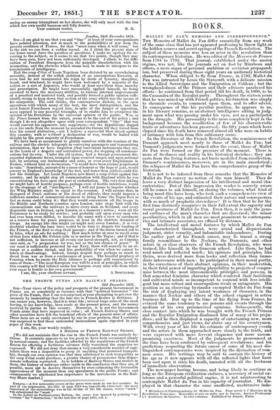trtttro to fly tifitur.
. DEFENSIVE iRECAUTION13.
22d December 1851.
Sin—Fear always appeals to prudence, and always attain direct opposi- tion to it ; therefore it is not to be wondered atr that your. Croydon corre- spondent of last week, who subscribed himself as " FrudensiTimidus," should exhibit in his communication more of the latter character indicated in his signature than of the former. In expressing his fears as to the danger of the English press denouncing the late illegal and monstrous proceedings of the French Dictator, he forgets that the greatest dangerthat any nation can incur from an ill-regulated press is that .of being corrupted and demoralized by an habitual servility and laxity of ,prineiple in its leading public writers, which may induce them to withhold, their censure where it is merited, and to lavish their praises on those least worthy of Ahem. , Meanness, and a disposition to gloss over acts of .villany, never yet raised a nation in the estimation of others, and, never failed to debase it in its own estimation. To me it appears a moat wholesome sign of public morality, (without which no nation is fit for or worthy of liberty,) that, with only one exception, the entire Metropolitan press of this country has boldly and honedly de- nounced the late acts of fraud and violence that have taken place in France ; a denunciation the more called for in consequence of the forced suppression of all independent organs of public opinion throughout-the rest of Europe. If, as your correspondent asserts, " the generality of the French people bear a cordial hatred towards Great Britain," that is no,reason why the latter should prove that she merits their hatred, as wellas their contempt; by justify- ing, or withholding condemnation of, the illegal and treacherous acts of which they are the unfortunate victims. Your correspondent appears to be quite alive to the danger incurred by England from the hostile dispositions of the despotic rulers in _Europe towards her, together with her own unprepared state to repel any aggression ; but, unfortunately, . the only means that he suggests for averting these dangers is a pusillanimous suppression of the truth. Now, pusillanimity never yet served as a check to an unjust aggression, and the only way to prevent such is to be prepared to repel it. It is an old saying, "La servitude commence par le sommeil " ; and our greatest danger lies in a supine confidence in our own security. Nobody ever doubted our means of self-defence against any enemy,. if we could : only be persuaded of its ne- cessity : some people will never believe in the possibility of an..aggression until they see their house occupied by an enemy. To Buck men warning is vain. Other men admit .the possibility of war ; and also believe, on the greatest military authority we possess, that our meana,of defence are quite insufficient; but they think the danger may not be imminent, and that a considerable expense may be saved:by delay. Now, the greatest_ temptation to an aggression consists in our unpreparedness to meet it; and we have public and oft-repeated warning from our most dangerous neighbours, that when they next attack us it will be by surprise, and without any previous announcement—" pour venger Copenhagen," asthe Jesuit paper D Univers, a short time since, expressed it. Our economical defenders would, be glad to see something done if it could be done cheaply, but would object to any comprehensive and really efficient plan of defence. . T. auit these, and to diminish in sonic measure, if not to guard against, all danger that may threaten us, I venture to make some suggestions as to an economical system of defence, which may perhaps be deemedworthy_of consideration. For a country without fortresses, and witb.,an„inconsiderablo military force, it is needless to say that an efficient fleet should be maintained on the coast of England, and that some efficient system should be resorted to for in- creasing and manning that fleet at a moment's warning. i.',AS; in fliture, all battles will be decided by the superiority of artillery and of well-directed musketry of long range, those nations whose force is the smaller numerically are under the greater obligation to be superior in these respects: Our ar- tillery is excellent as far as it goes ; but, unfortunately; it is. inferior nu- merically to that of any second-rate power in Europe. As for our infantry, owing to an extravagant economy, they are among the worst armed, and least skilled in firing, of any similar force in Europe. If all our infantry were armed and practised like the Chasseurs de Vincennes, they would be equal in efficiency to double their present force. In such ease, both our New Zealand and Caffre wars would lave been nipped in the bad : but when savages find that they fire better than the troops, they soon learn to despise the latter. Pretorius and the Emigrant Farmers never-miss their aim ; -and the Cadres take care not to quarrel with-them. A short time ago, two com- panies of British .infantry fired, at close; quartere upon seventeen fanatic 3loolahs in India, and did not kill one of them ; but of them were killed by the knives of their opponents before they, could despatch them with their bayonets. The men are not to blame for this inefficiency ; as their arms are bad, and they are not allowed (for the sake of economy !) to practise with ball-cartridge sufficiently to render them good shots. Why are the Rifles sent to the Cape ? Because they are considered as our most efficient in- fantry. Then why not render the whole army equally efficient by equally good arms and practice ? If, in addition to this, all our infantry were taught the duties of artillerymen, with a twelve-pounder wherever a regi- ment is stationed, for practice, we should then hare an army, small indeed, but ready for every emergency. As artillery-horses are not to be procuredat a short warning, all the horses of our cavalry regiments should be trained to act as such ; by which means, a regiment of cavalry can often carry off an enemy's guns instead of spiking them, and can bring guns into position which might otherwise remain useless. These changes in our system wont' cost little ; but with these changes, and a system of militia; which would= be too onerous, to support the army, we might bid defiance to all-Cost ar force that is ever likely to be brought against us. - Providence helps tin only who help themselves ; and if England should ever suffer the shamef
seeing an enemy triumphant on her shores, she will only meet with the fate which her own sordid baseness and folly deserve.



























 Previous page
Previous page